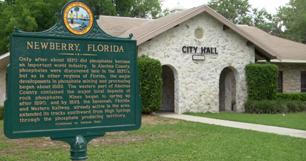NEWBERRY ‒ There was a large turnout for the joint City of Newberry Commission meeting with the Alachua County Board of County Commissioners (BoCC) on July 10 at the Easton-Newberry Sports Complex, a venue that was selected to accommodate the anticipated overflow of citizens. People filled the seats waiting to express their opinions on the proposed meat processing plant.
But prior to discussion of the topic most people were concerned about, Newberry Mayor Jordan Marlowe opened a lengthy dialog about roads, specifically CR 337.
Marlowe said the City was willing to provide land as part of the Newberry Environmental Park for property the County wanted to use for a rural waste collection center, meat processing facility and a $250,000 fire training tower. In exchange, Marlowe asked the County to move the schedule up on repairs to CR 337 to the date the Environmental Park would be completed in 2026.
County Commissioner Ken Cornell interjected that anticipated funding from the state had fallen through and suggested the meat processing facility be removed from consideration. He said he wanted to hear from Newberry’s residents and commissioners on the topic.
Throughout the meeting there was a tug of war between Cornell, who wanted to discuss the meat processing facility and other environmental projects, and Marlowe, who seemed primarily interested in hearing that the County would move the repairs for CR 337 up to 2026.
At one point Marlowe opened the floor for citizens to comment on their experience with CR 337 and the need for the road to be made safer. Approximately 18 people addressed both Commissions to explain just how dangerous the roadway was and their concerns about safety.
Alachua County Public Works Director Ramon D. Gavarrete addressed plans to improve roads in Alachua County as part of a planned pavement management plan approved by the County Commission. He said that a traffic study had been requested on CR 337 and it should be available in September. He suggested also that a four-way stop and turn lanes would likely remedy the problem with dangerous curves. He estimated the project cost would likely be $9 million.
County Commissioner Mary Alford moved to bump the timeline up on addressing the first segment of CR 337 and instruct City and County staff to work together on creating a funding and timeline solution to present to the commission.
Cornell proposed a substitute motion, which the commission split into two parts. The first part failed, 3-2, so the commission chose not to continue the vote to the second part. Returning to the original timeline, the commission carried Alford’s motion, 3-2.
County Commissioner Marihelen Wheeler asked about the possibility of the county purchasing the land from Newberry instead of leasing it. Newberry City Manager Mike New said for logistics purposes of providing utilities, it is best for the land to be leased, but he and Marlowe expressed openness to working out an agreement that was long-term and permanent enough to satisfy the County. New also mentioned that the County indicated they wanted to have the same type of arrangement with the City that they had when they purchased the property for IFAS, which was also leased.
By the time the floor was opened up for comments on the meat processing facility, several of the farmers had left the lengthy meeting, which extended past midnight. Approximately 14 people, many of whom identified themselves as vegans, addressed the remaining commissioners to speak against the meat processing facility. One person mentioned an online petition against the facility and another explained that a survey had been done and citizens didn’t know the facility was even being considered.
The facility was referred to as the “slaughterhouse” and “murder facility.” Comments were made about facility workers experiencing PTSD, becoming aggressive because of their job and tending to be more likely to abuse drugs and alcohol.
Speaking on behalf of approving the meat processing facility was the General Coordinator for the Agricultural Justice Project, Leah Cohen. She said that big agribusiness continues to thrive while small farms and retailers have gone out of business.
A local rancher said that people will continue to eat meat whether the plant is approved or not. He pointed out that currently the cattle have to be shipped to another location to be slaughtered and then shipped back, which ends up costing the consumer quite a bit more because of the shipping costs and prices other meat processing facilities charge.
As the subject of the meat processing facility was not to be decided at this meeting and the meeting had already run past midnight, the meeting was adjourned.
The topic is on the agenda for a BoCC meeting scheduled for the following day in the County Commission chambers.
# # #
Email cwalker@
alachuatoday.com
Newberry And County Talk Road Repairs and Meat Processing Plant
Tools
Typography
- Font Size
- Default
- Reading Mode


